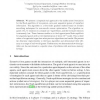156 search results - page 9 / 32 » Homotopy Methods to Compute Equilibria in Game Theory |
CORR
2010
Springer
13 years 7 months ago
2010
Springer
It is frequently suggested that predictions made by game theory could be improved by considering computational restrictions when modeling agents. Under the supposition that player...
SAGT
2010
Springer
13 years 6 months ago
2010
Springer
Abstract. One reason for wanting to compute an (approximate) Nash equilibrium of a game is to predict how players will play. However, if the game has multiple equilibria that are f...
IPL
2006
13 years 7 months ago
2006
We present a Coq-formalised proof that all non-cooperative, sequential games have a Nash equilibrium point. Our proof methodology follows the style advocated by LCFstyle theorem p...
ATAL
2010
Springer
13 years 8 months ago
2010
Springer
We consider the computational complexity of pure Nash equilibria in graphical games. It is known that the problem is NP-complete in general, but tractable (i.e., in P) for special...
WINE
2007
Springer
14 years 1 months ago
2007
Springer
We present a computational approach to the saddle-point formulation for the Nash equilibria of two-person, zero-sum sequential games of imperfect information. The algorithm is a ï¬...


